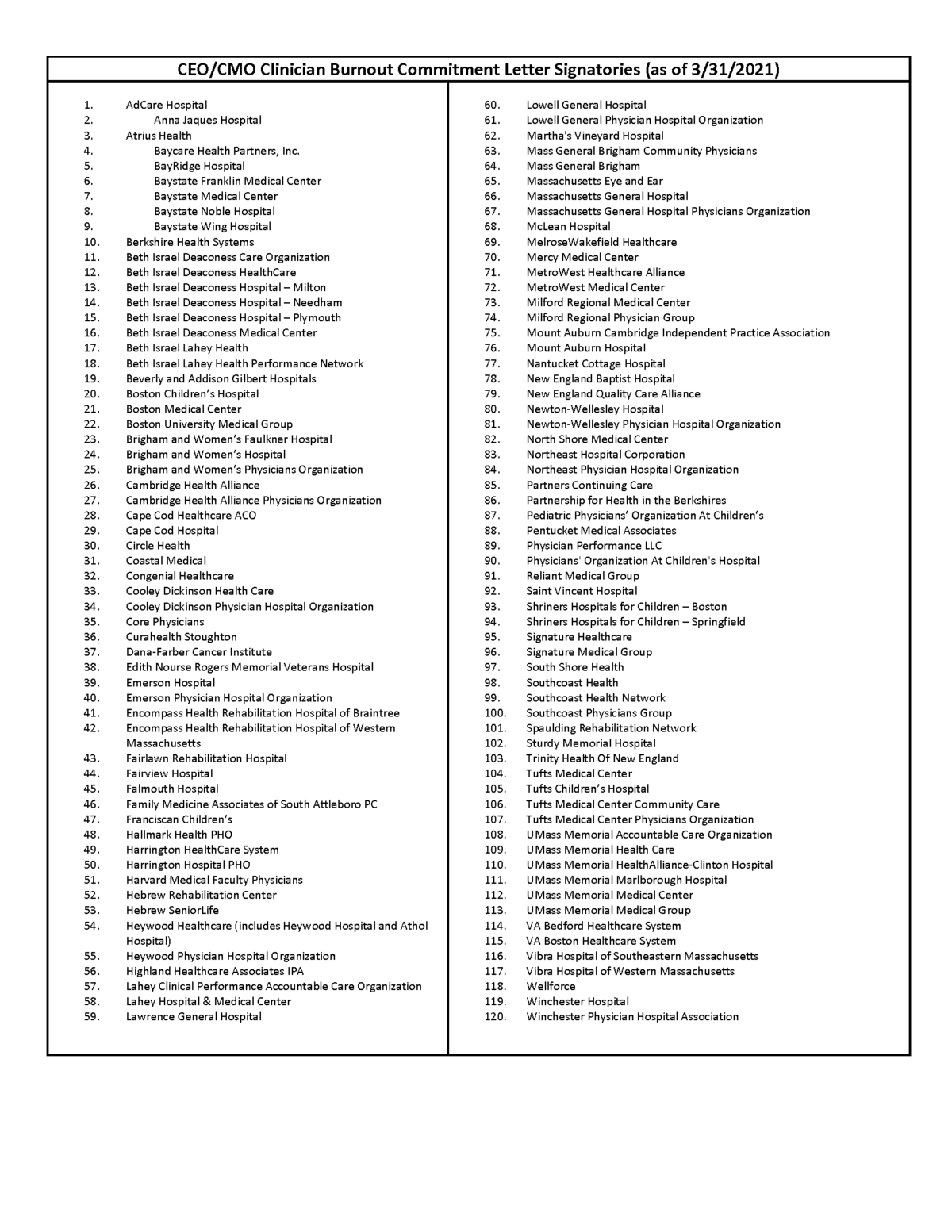Mass. hospitals, physician organizations, and healthcare leaders affirm commitment to address clinician burnout

As the COVID-19 pandemic continues to place tremendous strain on the resiliency and wellbeing of caregivers, some 120 Massachusetts hospitals, physician organizations, and healthcare leaders have signed on to an effort led by the Massachusetts Medical Society (MMS) and Massachusetts Health & Hospital Association (MHA) to continue their efforts in addressing clinician burnout. Leaders from each of the organizations listed below have committed to measuring a specific contributing factor to clinician burnout, and prioritizing improvements in that area as an institutional goal.
The MMS-MHA Joint Task Force on Physician Burnout (TFPB), in collaboration with local and national organizations, has closely analyzed the causes of physician and clinician burnout, and has identified and shared effective burnout reduction strategies. The task force continues to pinpoint opportunities to reduce administrative burden and other contributors to clinician burnout, and actively advocates for their adoption. Now more than ever, the TFPB members believe commitment at the highest levels of the healthcare organization is necessary to effectively reduce clinician burnout.
Each of the organizations listed below will select a measure of clinician wellness or burnout, measure its prevalence in their organization over time and include improving that measure as an institutional goal.
“Our caregivers are often called heroes, but they are still very much human and are subject to more stress and strain than ever before,” said Steve Walsh, president and CEO of the Massachusetts Health & Hospital Association. “Our hospitals and healthcare leaders are focused on ensuring that our most valuable resource – our clinicians – get the support they need. This latest commitment has the flexibility to allow our organizations to focus on specific areas tailored to their individual needs, which ultimately helps us address burnout on a united front.”
“The issue of clinician burnout was at an alarming level long before COVID-19. We are fortunate that healthcare leaders and systems came together to acknowledge and begin to address the issue,” said Dr. David A. Rosman, president of the Massachusetts Medical Society. “During the pandemic, members of the health team demonstrated their unwavering commitment to their patients, no matter the risk. It turned out that the risk was more than COVID-19 – working to the brink of exhaustion and despair, mental health has been pushed to and in some cases over the edge. This commitment to addressing burnout and deploying institutional improvements is a critical step in assuring that clinicians and all healthcare teams are able to deliver care to our patients through the pandemic and beyond.”
The TFPB has outlined some its findings in its publications Changing the EHR from a Liability to an Asset to Reduce Physician Burnout and A Crisis in Health Care: A Call to Action on Physician Burnout. The group’s work also aligns closely with the work of MHA’s Caring for the Caregiver Task Force, which focuses on challenges relating to worker safety, wellbeing, engagement, and development and deployment of staff. A recently released Caring for the Caregiver Task Force Report, which includes information about clinician burnout provided with MMS leadership, is available on MHA’s PatientCareLink site.


 Massachusetts Health & Hospital Association
Massachusetts Health & Hospital Association